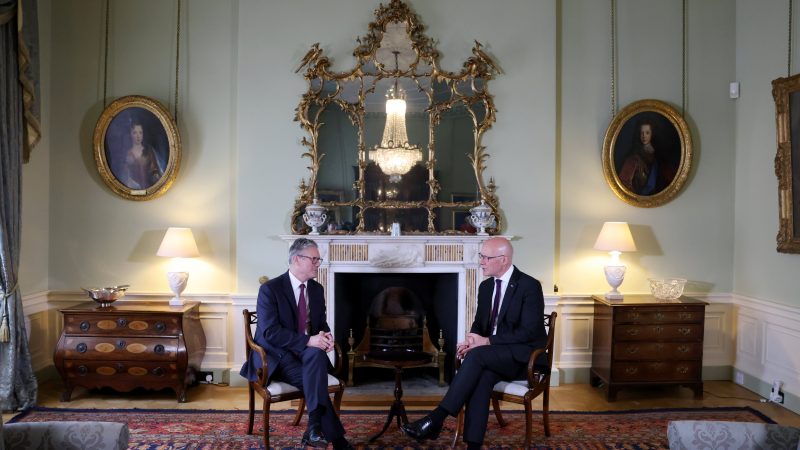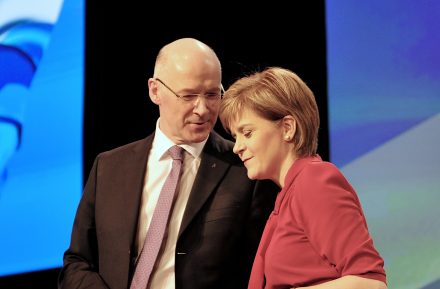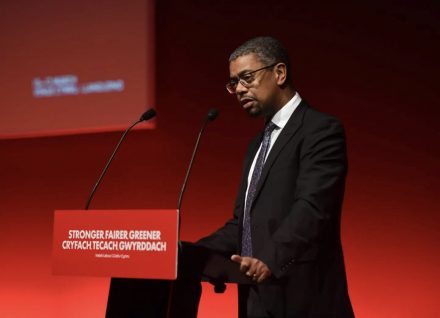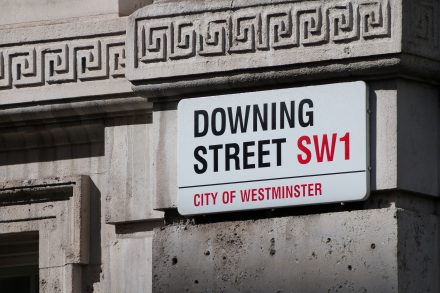
Keir Starmer is meeting with the First Ministers of Scotland, Northern Ireland and Wales today and tomorrow, and with the UK’s metro mayors on Tuesday. This will make Starmer the first Prime Minister to meet with the heads of the UK’s devolved governments and its metropolitan mayors so soon after taking office.
It was perhaps the most striking announcement of his first press conference as Prime Minister. The move may hint at a major difference between the Labour government and its Tory predecessors. Especially after the Brexit referendum, successive Tory Prime Ministers had relations with devolved governments that were often incoherent and at times seemed mutually hostile.
Starmer clearly aimed to hit a very different note at his press conference. He emphatically committed himself to working across party lines, saying that devolved leaders could have good ideas regardless of the ‘colour of their rosette’. Wales is the only devolved administration led by a Labour First Minister, and not all of the country’s metro mayors are Labour.
Read more of our 2024 general election results coverage (article continues below):
Election night as it happened: Key results unpacked in historic landslide
Labour results tracker: Full list and map of Labour gains, holds, losses, new MPs
‘We did it’: Keir Starmer’s victory speech as Labour crosses key 326 seat line
‘A landslide masks discontent left, right and centre. Labour has its work cut out’
‘What should we look for in Keir Starmer’s cabinet?’
‘Keir Starmer is at the peak of his power. How should he make the most of it?’
Scottish resurgence on the cards
Starmer’s overtures come from a position of strength . As Starmer noted, “for the first time in 20-plus years, we have a majority in England, in Scotland and in Wales, and that is a clear mandate to govern for all four corners of the United Kingdom.”
That strength is particularly clear in Scotland, where Labour’s vote share was up 17 percentage points. On current Westminster form, Labour has its best chance of becoming the largest party at Holyrood since 2007. Labour devastated the Scottish National Party’s Westminster representation on July 4th, in the latest round of the notoriously bitter battle between the two parties.
The next elections to the Scottish Parliament in Holyrood are scheduled to take place in May 2026. Labour only led the devolved Scottish government for the first years of its existence. From 2007 onwards, it has been led by a series of SNP First Ministers. The SNP seemed politically unassailable after its crushing Westminster and Holyrood election victories following the 2014 referendum on independence.
READ MORE: Starmer pledges ‘raw honesty’ and does not commit to reverse two-child cap
But Nicola Sturgeon’s resignation in March 2023 and Humza Yousaf’s in May this year are only some of the SNP’s troubles. Yousaf’s last effective act was to end the SNP’s alliance with the Scottish Green Party. Sturgeon and her husband, former SNP chief executive Peter Murrell, were both arrested over allegations about the party’s finances, though both strongly deny wrongdoing.
John Swinney, who succeeded Yousaf, is the latest First Minister to try to account for what a growing number of Scots regard as SNP failures in a wide range of fields. The SNP is being angrily criticised by a once-friendly media for many of its policies: in education, drug treatment, road building, and the provision of ferries for Scotland’s islands.

In the past, the SNP has shown great capacity for blaming all Scotland’s problems on the failure of British governments to grant Holyrood enough powers and funding. Labour’s manifesto has promised an increase in devolved powers. Whatever Starmer offers, it will almost certainly not be enough for the SNP’s politicians, who will continue to say they could do far more if only London would let them.
READ MORE: Sign up to our must-read daily briefing email on all things Labour
In the past, enough Scots voters have agreed with that argument to give the SNP 17 years leading Holyrood governments. But under Anas Sarwar, Scottish Labour will bid to end that. How both Starmer and Sarwar act will be crucial in deciding whether Thursday’s election results were the beginning of a resurgence for Scottish Labour, or just a false dawn.
Complex problems abound though
Both Starmer and Swinney struck a positive note after their meeting today about “constructive”, “productive” working between governments.
Yet the devolved administrations, combined authorities and local authorities have all faced considerable and growing challenges over the last 14 years. They have not hesitated to pin much of the blame for this on the actions of successive Tory governments in Westminster – in particular on the effects of austerity on their funding.
In turn, several Tory Prime Ministers – including most notably, if least surprisingly, Boris Johnson – had extremely tense relationships with the Scottish administration in particular.
Those challenges now confront the Labour government. How it works with the devolved administrations and local authorities will crucially affect how it delivers its pledges, how far rival parties can continue to pin the blame on central government, and whether Labour wins reelection.
Cash-strapped councils
Across the UK, many local councils are struggling to provide basic services to their communities. The Institute for Government estimates that councils’ financing fell by 31% in real terms between 2009-10 and 2021-22. The Local Government Association estimates the drop in financing has been 27% since 2010. Since 2018, 13 local councils have issued ‘section 114’ notices – effectively declaring bankruptcy.
Beginning to reverse the damage caused by this will be one pressing problem for Starmer’s team. But Starmer and Rachel Reeves’s commitment to fiscal rules makes it unlikely that they will see a rapid increase in their funding settlements from Whitehall.
The devolved administrations are unlikely to be happy about waiting long for more money, and – except perhaps in Labour-run Wales – they are unlikely to keep their complaints to themselves. Regional mayors are also likely to keep pushing for more powers, potentially beyond what Starmer’s government is willing to grant.
How much goodwill Starmer’s government can create with devolved administrations and local councils may have a crucial effect on how voters see it.
Councils could also potentially play a key role in such Labour pledges as boosting economic growth and productivity and increasing housing supply. Angela Rayner, Secretary of State for Levelling Up, Housing and Communities, will be a key figure as the government grapples with these complex matters.
READ MORE: Revealed: How many battleground election targets did Labour win and lose?
Embattled Welsh First Minister

Labour is the largest party in Wales’ Senedd, with Vaughan Gething leader and First Minister since March 2024. Wales, like all the devolved administrations, has complained bitterly about decreases in Whitehall funding since 2010.
NHS Wales, run by the devolved government, has experienced some of the worst waiting list times in any part of the UK. Successive Tory spokesmen have blamed its problems on Welsh Labour, which has in turn pointed to the cuts in central government financing.
But Labour’s potential challenges in Wales do not end there.
READ MORE: David Blunkett: ‘Rejoice – but tough choices loom handling so many new MPs’
Since First Minister Gething won a sharply-contested leadership election against Jeremy Miles, he has been dogged by criticism over donations to his campaign by a businessman previously been convicted of environmental offences.
He has also faced criticism over WhatsApp messages about government business sent during the Covid-19 pandemic being deleted, though Gething has denied wrongdoing on both counts.
The attacks have however had political consequences. In May 2024, Plaid Cymru withdrew from its agreement to support Labour in the Senedd, and the assembly narrowly passed a motion of no confidence in Gething on June 5th, albeit one which Gething dismissed as having no significance.
But it remains to be seen how these controversies will develop now that the general election is over and attention returns to the Senedd.
Fragile progress in Northern Ireland
Keir Starmer’s government differs from many of its predecessors in the number of senior personnel who are deeply interested in Northern Ireland. Starmer himself spent four and a half years in a high pressure role as human rights adviser to the Northern Ireland Policing Board from 2003 to 2007. Sue Gray, his chief of staff, famously ran a pub in Newry in the 1980s, during the Troubles, and is married to a man from County Down.
Northern Ireland spent two years without a functioning executive until February 2024. The hiatus was in large part because of the incoherent policies on the border pursued after the Brexit referendum by a series of Tory Prime Ministers.
READ MORE: Cabinet and minister appointments: Full list versus Labour shadow frontbench
Rishi Sunak’s deal with the European Commission to resolve this was his biggest – perhaps his only – substantive achievement in No 10. Sinn Féin’s Michelle O’Neill became Northern Ireland’s First Minister, with the Democratic Unionist Party’s Emma Little-Pengelly as the Deputy FM.
But Starmer will be acutely aware that this was not the Northern Ireland Executive’s first crisis since it was created by the Good Friday Agreement. For almost exactly one third of the first 24 years of its existence, either the devolved government has been suspended or has failed to function due to party disagreements.
There has been no return to full-scale sectarian violence since 1999. But Starmer and Northern Ireland Secretary Hilary Benn will not view that as grounds for complacency.
Overall, Starmer’s decision to hit the reset button on government relationships with devolved leaders is a positive move and likely to be well-received – but it may well also prove the easy part.
Read more on how the night unfolded:
Scotland results: Labour makes big gains as SNP obliterated
Wales results: Labour bags 27 of 32 seats as Tories wiped off the map
Jacob Rees-Mogg: Senior Tory loses seat as Labour mayor Dan Norris wins
Gaza: Jon Ashworth loses in Leicester as independents win Blackburn and Batley
Islington North: Jeremy Corbyn holds on in strong result over Labour
Nuneaton, Stevenage, Swindon, Worcester: Labour wins in key bellwether marginals
Read more on what could come next for Labour in power:

100 days: What happens during the first 100 days of a Labour government?
Delivering pledges: ‘Change is hard – how can Labour achieve it?’
Manifesto: ‘12 great policies you may never have heard of’
Foreign affairs: ‘Whatever happens to Biden, Starmer faces a US challenge’
Trilemma: IFS warns Starmer will likely have to pick cuts, debt or tax hikes
Read more on how Labour fought this campaign in key battlegrounds:

Aldershot: Can Labour win the ‘Home of the Army’ for the first time in a century?
Bolsover: Labour’s Natalie Fleet on death threats, Dennis Skinner and class today
Brighton Pavilion: Can Labour win the Greens’ one seat?
Bristol Central: Inside Labour’s battle to counter the insurgent Green Party
East Thanet: Inside the battle for coastal ex-UKIP stronghold not won since 2005
Edinburgh endgame: The seat where SNP defeat would signal Labour majority
Dover and Deal: Small boats and Tory mutineers: Can veteran Mike Tapp win?
Finchley and Golders Green: Can Labour win back Britain’s most Jewish seat?
Glasgow South West: Meet the NHS doctor fighting one of Scotland’s tightest marginals
Monmouthshire: ‘Why this CLP is setting the standard in this campaign’
Sheffield Hallam: ‘Can Labour’s Olivia Blake hold on in Nick Clegg’s old seat?’
South West: Could Labour take ‘non-battleground’ Tory seats?
Wimbledon‘s battle of the bar charts: Inside a rare election three-horse race
SHARE: If you have anything to share that we should be looking into or publishing about this story – or any other topic involving Labour or the election – contact us (strictly anonymously if you wish) at [email protected].
SUBSCRIBE: Sign up to LabourList’s morning email here for the best briefing on everything Labour, every weekday morning.
DONATE: If you value our work, please donate to become one of our supporters here and help sustain and expand our coverage.
PARTNER: If you or your organisation might be interested in partnering with us on sponsored events or content, email [email protected].




More from LabourList
‘Tackling poverty should be the legacy of Keir Starmer’s government’
‘The High Court judgment brings more uncertainty for the trans community’
‘There are good and bad businesses. Labour needs to be able to explain the difference’